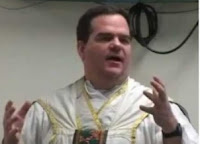Dietrich von Hildebrand asks the question: "Does Catholic orthodoxy and filial submission to the Vicar of Christ require one to hail every practical decision of the Holy Father?" There are Catholics who answer this question with a strong resolved:
"Yes, and those who do not hail or praise every practical decision of the Holy Father are acting against orthodoxy." I believe this unfortunate conclusion is founded on a common misunderstanding of
papal infallibility and on some well-intentioned but misguided respect of the one who holds this Holy Office.
It is ridiculous to 'hail' or 'praise' some action of the Holy Father
only because it is an action of the Holy Father. It is also ridiculous to condemn some action of the Holy Father because it is an action of the Holy Father. It just does not make any sense. It is unreasonable. While I know that examples do exist, I do not believe the later scenario happens nearly as frequent as the former. (That is only my observation, and not something I would argue very strongly on if challenged.)
If the pope were to modify or adapt some legal requirement for this or that, you should not say, that modification is good because the pope did it. Knowing this modification has come from the Holy Father, you might first choose to seek a good reasonable explanation. You might resolve to state that you do not have enough information to understand the decision made. In the end if there is a judgment to be made, you would state that it is good or unfortunate because of something having to do specifically with the change itself. You would not base the judgment simply on the fact that the pope made the modification. (I hope it is clear what I took three paragraphs to say.)
So to the topic. I should confess that while I knew of the foot washing -- of the gentler sex -- by the Holy Father... I have ignored the topic completely -- until today. For whatever reason I choose to read G+ as my first activity after consecrating my day. Much of this post comes from my participation in a
discussion on the Holy Thursday washing of feet.
Some facts (by which I mean that I do not think they are debatable):
1) There currently (at least before Thursday) exists a law that directs the washing of feet to take place with men only.
2) This law is an example of such a law that the Holy Father has authority to change.
3) The Holy Father washed women's feet without formally changing the law.
Now, I honestly do not know if
this law in
this specific circumstance can be changed simply by the action of the Holy Father. I suspect that good canon lawyers might even have some disagreement on the subject. I had an opinion... but I am not a canon lawyer, and I am fairly sure that my opinion was wrong.
What I will say is that I find it unwise that the Holy Father, who as supreme legislator could have formally changed this law -- didn't -- before performing an action (licitly or illicitly) that was contrary to the law as written. I say it is unwise because even if the Holy Father's action is within the law, the fact remains that the contrary is still "on the books" and confusion has resulted. Those who disobediently went against the law, acting as their own pontiffs for years, point to the Holy Father's action to support their disobedience. Many who have defended the law are now set in confusion. The defense of "caritas ante lex" with references to our Lord and the Pharisees only serves to cloud the subject further. All the while... the importance of Holy Thursday seems left the dust.
Please note that I did not say it was "unwise because Pope Francis did it." (I also have not offered judgment on the washing of 'non-viri' feet!) I hope that if one were to explain why they believe it was a good idea to forgo a formal change before the action, that they also provide more than "it is good because Pope Francis did it." For those of you who do not think I can love our Holy Father and find this practical action unwise -- please read Dietrich von Hildebrand's response to the question above:
Belief and Obedience: The Critical Difference
If the pope intended to change the law, it seems that it would have been better for him to change law prior to performing the action. He could have done this but from what I know, he did not. To date
Fr. Lombardi has given comment, but I think more (read better) explanation could be given. Hopefully more explanation comes long before next Holy Thursday.
Edit: Fr. Byers
provides some thoughts and
addresses some commentary that I should have read before writing this post.

